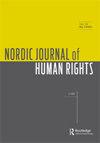K'iche '玛雅文字传统和危地马拉Totonicapán的文化遗产
IF 1.2
Q3 POLITICAL SCIENCE
引用次数: 0
摘要
危地马拉Totonicapán的K'iche '玛雅文化遗产的重要组成部分,包括一些写于16世纪中叶的文件。有问题的语料库的大部分仍然保存在原地,在他们的原始社区。本文讨论了这些文件的保护、管理和解释,所有这些做法都与社会组织的社区传统和构成Totonicapán市的48个社区或州(cantones)的习惯规范密切相关。它还旨在了解现代化对这些管理实践的影响,以及采用基于权利的方法将如何改变它们。paxtoc本文章由计算机程序翻译,如有差异,请以英文原文为准。
The K'iche’ Maya Written Tradition and the Cultural Heritage of Totonicapán, Guatemala
ABSTRACT An important part of the K'iche’ Maya cultural heritage of Totonicapán, Guatemala, consists of certain documents written in the middle of the sixteenth century. Most parts of the corpus in question are still preserved, in situ, in their communities of origin. This paper discusses the conservation, management, and interpretation of these documents, all practices that are tightly linked to communal traditions of social organisation and customary norms in the 48 communities or cantons (cantones) that make up the municipality of Totonicapán. It also aims to understand the impact of modernity on these management practices and how the adoption of rights-based approaches will change them. Paxtocá is one of the cantons in possession of such documents, and over the last decade an important part of community politics in Paxtocá has revolved around what to do with that heritage, which is simultaneously local, K'iche’, Pan-Mayan, and national Guatemalan. This historical and political complexity produces equally complex challenges for human-rights-based heritage politics.
求助全文
通过发布文献求助,成功后即可免费获取论文全文。
去求助
来源期刊

Nordic Journal of Human Rights
POLITICAL SCIENCE-
CiteScore
1.00
自引率
25.00%
发文量
29
期刊介绍:
The Nordic Journal of Human Rights is the Nordic countries’ leading forum for analyses, debate and information about human rights. The Journal’s aim is to provide a cutting-edge forum for international academic critique and analysis in the field of human rights. The Journal takes a broad view of human rights, and wishes to publish high quality and cross-disciplinary analyses and comments on the past, current and future status of human rights for profound collective reflection. It was first issued in 1982 and is published by the Norwegian Centre for Human Rights at the University of Oslo in collaboration with Nordic research centres for human rights.
 求助内容:
求助内容: 应助结果提醒方式:
应助结果提醒方式:


